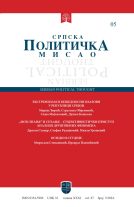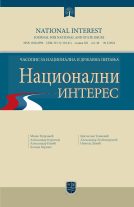- Home page
- Researchers
- MA Bojana Sekulić
MA Bojana Sekulić
Bojana Sekulić is a Research Trainee at the Institute for Political Studies in Belgrade. She is attending doctoral studies in Sociology at the Faculty of Philosophy, University of Pristina, with temporary headquarters in Kosovska Mitrovica. Her fields of interest are: social aspects of education, especially political education and educational policies. She has published about a ten papers in journals and other scientific publications. She participated in three international scientific conferences and two national ones. At the Institute for Political Studies, she was engaged in the work of editorial secretary in the magazines National Interest, Administration and Public Policy and Social Policy.

INSTITUTIONAL EDUCATION FOR DIALOGUE AND TOLERANCE IN SERBIA
Education for dialogue and tolerance in institutional schools in the Republic of Serbia began intensively at the time of the beginning of the education reforms in 2001, first by introducing the subjects Religious Education and Civic Education into the educational process, and then by redefining the teaching content in general education subjects in basic and secondary schools. There are many different public debates about the effects of the Religious Education and Civic Education subjects, as well as some partial researches, which indicate different results. The subject of this paper is the consideration of the basic characteristics of education for dialogue and tolerance, as well as educational models of their implementation, with special attention being paid to primary and secondary education in Serbia. In this research, the method of content analysis was applied, which was approached from a holistic point of view, which entailed a detailed study of certain contents in the scientific literature, analysis of relevant documents and published results of previous research. At the same time, special attention was always focused on understanding the meaning of those contents and their structure in the context of the topic of this paper. The results of this research show that institutional education for dialogue and tolerance in Serbia is consistent with: cultural and social values; ideological and political goals of the development of society; and that such education is correlated with relevant international documents and experiences of European democratic societies, all of which should contribute to the development of the neoliberal model of political culture. The potential of education for dialogue and tolerance in Serbia is great, but the reliable effects of such education are still questionable.


SAVREMENE SOCIOLOŠKE TEME
Prikaz monografije: Mitrović Ljubiša, R. 2022. Sociološke marginalije na savremene teme. Novi Sad: Prometej, 360 str.

